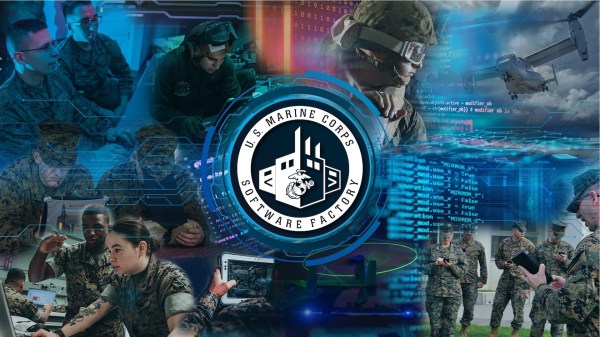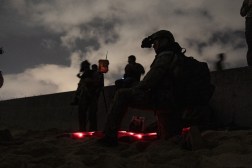Marine Corps about to release new warfighting publication on information operations

The Marines are about to wrap up a new publication focused on the practical applications of the service’s information doctrine, according to a senior officer.
Last year, the service released Marine Corps Doctrinal Publication-8, Information, that aimed to describe the purpose and mechanics of using information as a warfighting tool for the entire force. A follow-on publication, known as Marine Corps Warfighting Publication 8-10, has been in the works.
“MCDP-8 was a cognitive discussion, you know, more of a discussion than educational,” Lt. Gen. Matthew Glavy, deputy commandant for information, told DefenseScoop Monday during a Q&A after his keynote at the Association of Old Crows annual symposium. “So, 8-10 gets into the practical application. So, we’re in the final stages — 30 days [until it’s released]. Write it down, 30 days. As you know, all the reviews of publications always take a little longer than expected. But 30 days, there’s your answer.”
Earlier this year, Glavy told DefenseScoop that the new document will help Marine Expeditionary Force commanders, regimental commanders, division commanders, company commanders, squadron commanders and others understand how the Corps can best use information to carry out its missions.
“If we don’t put our hearts and minds to truly understand the power of data, ultimately information, we’re gonna be in an awkward place,” Glavy said during his keynote at the Association of Old Crows event.
Earlier this year, the service officially activated Marine Corps Information Command (MCIC), which was stood up to more tightly link its various information forces — including cyber, intelligence and space — with the broader joint force.
Glavy noted that the command and related elements of the Corps have connections with U.S. Cyber Command, U.S. Space Command, the National Security Agency and the National Reconnaissance Office.
The push by the Marines to boost their prowess in information-related ops comes as the U.S. military writ large is trying to improve its posture in this realm.
The Air Force has developed a classified information warfare strategy and implementation plan. And the Army recently issued Doctrinal Publication 3-13, Information — it’s first such doctrine for information.
Additionally, a few weeks ago the Pentagon unveiled a new strategy for planning, resourcing and employment of its capabilities and forces.
“DoD must embrace a cultural shift wherein information is a foundational element of all military strategies and [operations, activities, and investments], and where the consistent integration of informational and physical power becomes the norm,” the document states.
The U.S. military defines the information environment as the “aggregate of social, cultural, linguistic, psychological, technical, and physical factors that affect how humans and automated systems derive meaning from, act upon, and are impacted by information.”
Lawmakers are also pushing the department to make improvements and incorporate lessons learned from real-world events.
The compromise version of the fiscal 2024 National Defense Authorization Act, unveiled last week, would require the Pentagon to study the impact of information ops during Russia’s war with Ukraine. The legislation calls for the department to enter into an agreement with an outside entity for an independent assessment of Moscow’s information operations capabilities prior to, and since the invasion of Ukraine; an assessment of successes and struggles associated with information ops conducted by the U.S., other NATO members and Ukraine prior to, and since the invasion; and recommendations for how the United States can enhance the effectiveness of its information operations.






